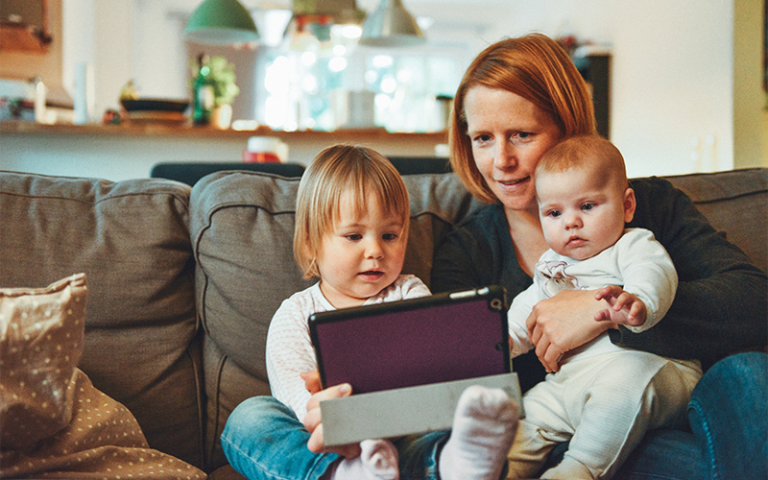Parents, especially mothers, paying heavy price for lockdown
27 May 2020
School closures, massive rates of job loss and furloughing, and a shift to working from home are all affecting how parents spend their time, and how mothers and fathers divide responsibilities for paid work, housework and childcare.

Researchers from UCL Institute of Education (IOE) and the Institute for Fiscal Studies have specially designed an online survey, funded by the Nuffield Foundation and fielded between 29 April and 15 May, to capture how 3,500 families with two opposite-gender parents are sharing paid work and domestic responsibilities.
They found that mothers are more likely than fathers to have left paid work since February and among mothers and fathers who are still in paid work, mothers have seen a bigger proportional reduction in hours of work than fathers. The team also found that among those doing paid work at home, mothers are more likely than fathers to be spending their work hours simultaneously trying to care for children.
The combined effect is that in lockdown, mothers in two-parent households are only doing, on average, a third of the uninterrupted paid-work hours of fathers. Before lockdown, mothers did around 60% of the uninterrupted work hours of fathers. This sharp reduction in the time that mothers are spending dedicated to paid work risks lasting harm to their careers when the lockdown is lifted.
The survey also reveals the extent to which mothers have picked up the bulk of the time spent on new responsibilities for childcare and housework: they are looking after children during an average of 10.3 hours of the day (2.3 hours more than fathers), and are doing housework during 1.7 more hours than fathers. However, fathers have also increased the time they spend on housework and childcare: fathers are, on average, now doing childcare during nearly twice as many hours as in 2014–15. This means that fathers are now taking on a greater share of household responsibilities than they were before the crisis.
The report also finds that mothers are 23% more likely than fathers to have lost their jobs (temporarily or permanently) during the current crisis. Of those who were in paid work prior to the lockdown, mothers are 47% more likely than fathers to have permanently lost their job or quit, and they are 14% more likely to have been furloughed. In all, among those working in February 2020, mothers are now 9 percentage points less likely to still be in paid work than fathers.
Also, mothers who are still doing paid work have reduced their paid working hours substantially and by more than fathers. Prior to the crisis, working mothers did paid work in 6.3 hours of a weekday on average; this has fallen by over one-fifth to 4.9 hours. Working fathers’ hours have also fallen, but by proportionally less, from 8.6 hours before the crisis to 7.2 hours now.
Mothers are also far more likely to be interrupted during paid working hours than fathers. Almost half (47%) of mothers’ hours spent doing paid work are split between that and other activities such as childcare, compared with under one-third (30%) of fathers’ paid working hours. Where focused work time is important for performance, gender differences in interruptions and multitasking risk further increasing the gender wage gap among parents.
The study also found that in families where the father has lost his job while the mother kept hers, men and women still split housework and childcare responsibilities fairly equally. In all other types of households, mothers spend substantially more time on domestic responsibilities.
Alison Andrew, a Senior Research Economist at the Institute for Fiscal Studies, said: "Mothers are more likely than fathers to have moved out of paid work since the start of lockdown. They have reduced their working hours more than fathers even if they are still working and they experience more interruptions while they work from home than fathers, particularly due to caring for children. Together these factors mean that mothers now are only doing a third of the uninterrupted paid-work hours that fathers are. A risk is that the lockdown leads to a further increase in the gender wage gap."
IOE professor Almudena Sevilla, one of the authors of the study said: “Time use diaries reveal that mothers are taking the majority of additional childcare as a result from COVID-19, which is really disrupting. It is not surprising then that women are losing their jobs to a greater extent than men as a result from this crisis.”
Links
- Read the Briefing Note: ‘How are mothers and fathers balancing work and family under lockdown?’
- Institute for Fiscal Studies
- View Professor Almudena Sevilla's research profile
- COVID-19 research at UCL Institute of Education
- Centre for Time Use Research
- Department of Social Science
 Close
Close

